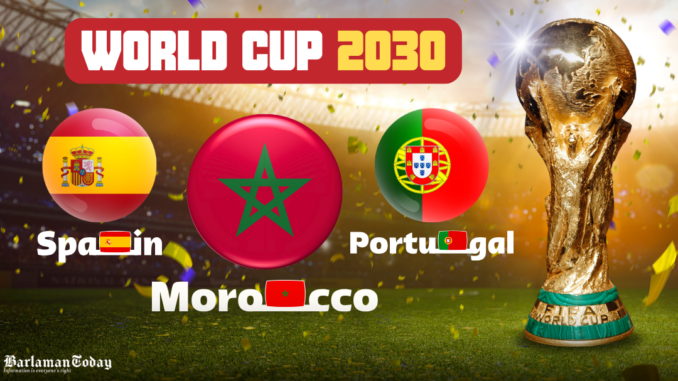
The Royal Moroccan Football Federation (FRMF) celebrated, on Wednesday in Salé, the official designation of Morocco, Portugal and Spain as hosts of the 2030 World Cup by the FIFA Congress, gathered in an extraordinary session by videoconference.
The celebration, held at the Mohammed VI Football Complex, was attended by several officials, sports figures, former Moroccan and African soccer legends, as well as members of the FRMF.
On this occasion, FRMF vice-president Mohamed Joudar highlighted the efforts made by Morocco over the last few years to host the world soccer’s flagship event.
“Hosting the 2030 World Cup is the fruit of Morocco’s sports policy, under the enlightened leadership of HM King Mohammed VI, and the investments made to strengthen sports infrastructure and training,” Joudar told the press.
“This is a historic day for Morocco, Spain and Portugal. For the first time in history, two continents will be hosting the World Cup.”
In the same vein, Noureddine Naybet, a 2030 World Cup ambassador, noted that the Kingdom’s hard work over several years had finally paid off.
“This day will be historic for the three host countries, as well as for the whole Africa and the whole Europe,” said the former captain of Morocco’s national football team.
For his part, former Senegalese football legend El-Hadji Diouf pointed out that this World Cup is an honor not only for Morocco, but a privilege for the whole of Africa.
“It’s a gift for the continent’s youth and for all African football enthusiasts,” he said.
Diouf, one of the heroes of Senegal’s 2002 FIFA World Cup victory, thanked King Mohammed VI for his commitment to the development of Africa and African sport.
Spanish coach of the Moroccan women’s football team Jorge Vilda, highlighted the efforts of Morocco and the FRMF to promote this sport in the country.
The former world champion with Spain’s women national team said he was convinced that results will continue to live up to expectations.
For former legend of Ivorian soccer Salomon Kalou, hosting the 2030 World Cup in Morocco is a source of pride for the whole of Africa.
“A World Cup held in Africa, the cradle of mankind, and the Old Continent will be an event that will go down in history,” said the former Chelsea striker.
FIFA chief Infantino had recalled after the official announcement of the host countries that Morocco’s fans had made a huge impression at the FIFA World Cup Qatar 2022 when their team became the first from Africa to reach the semi-finals.
“Everyone knows the fans of Morocco. They are absolutely unique and fantastic,” he said. “The people that will go to Morocco will be welcomed like nowhere else. It will be a huge celebration of humanity, of football, of togetherness,” he said.
Speaking on the same occasion, head of the Moroccan football federation FRMF Fouzi Lekjaa said “It’s a rich moment, in many ways, starting with global representation, rarely seen or acknowledged in other fields.”
“I would like to thank you for putting your trust in my country, Morocco, along with our two partners, Portugal and Spain, to collectively host the [FIFA] World Cup in 2030. This trust that you put in my country, by nominating it within this three-party candidacy, once again proves the progress made both in terms of specific preparations for the event and global growth for the country,” he said.
Head of the African football federation (CAF) congratulated Morocco on this African achievement.
“The alliance between Morocco, Portugal, and Spain represents a symbolic bridge between Africa and Europe through football, and it inspires all stakeholders in the football world to work together to make the world a better place,” CAF president Patrice Motsepe said.
“I would also like to extend my thanks to the 54 member associations of CAF for their solidarity and unwavering support for Morocco’s bid,” he said.
From Lisbon, President of the Portuguese Football Federation (FPF), Fernando Gomes, said the joint bid is a historic proposal that will serve the interests of global football.
“The confirmation of the selection of our bid for the 2030 World Cup is a decision that honors our history, recognizes our organizational capacity, and rewards the boldness of a transcontinental and multicultural candidacy,” he declared during the FIFA Congress.
Morocco, Portugal, and Spain have presented a multicultural, multilingual, and multi-geographical candidacy. This bid is historic—not only in material terms but also in the principles we aim to establish and leave as a legacy for the future, Gomes stated further.
“There is no better opportunity than the World Cup to promote diversity, inclusion, human rights as a foundation and pillar of the competition, and sustainability as a declared goal,” he said, adding “We want to reach new levels in environmental efforts. By combining all these aspects, we will promote and care for the most globalized sport on the planet! Let us celebrate the history of the tournament while safeguarding its future and modernization.”
President of Spain’s Supreme Council for Sports (CSD), José Manuel Rodríguez Uribes, on his part, commented the 2030 FIFA World Cup, officially awarded to Morocco, Portugal and Spain, “will be the best in history both in sporting and organizational terms.”
The CSD President was quoted in a CSD press release as saying that this major event in world football “will also contribute to social cohesion, unity, and collective pride.”
“This World Cup’s edition will be an exceptional event for experiencing the passion of football, promoting the sports industry, stimulating job creation in key sectors and attracting foreign investment in infrastructure and technology,” he noted.
